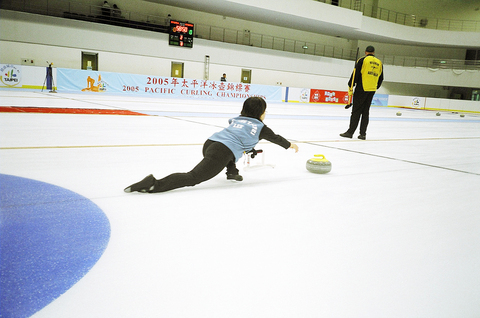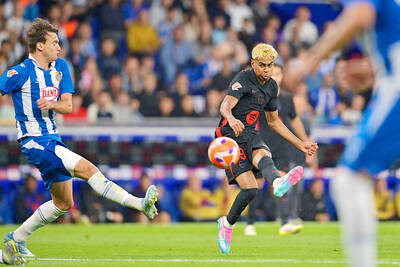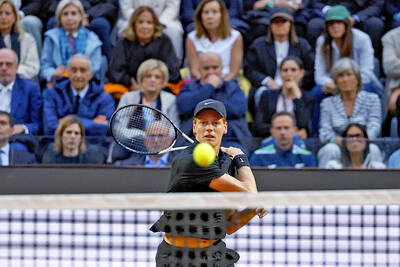A low rumble fills the ice arena as the sound as 18kg granite stones slowly slide across a pebbled ice surface. The sound and visual sensation is like nothing else, like watching a glacier move or ice settle into a glass of vodka.
"On average, it takes each stone 26 seconds to travel across the ice," said Wally Henry, coach of the Chinese-Taipei Women's Curling Team.
He should know, as he routinely uses a stopwatch to measure the consistency throws made by his four-person curling team.

PHOTO: SEAN SCANLAN
Curling teams from South Korea, Japan, China, New Zealand, and Australia are in town for the 2005 Pacific Curling Championship, held at the Taipei Arena with championship round scheduled for Wednesday at 1:30pm.
On the days leading up to gold medal rounds, matches are open to the public and free of charge -- taking place every day with rounds scheduled at 8:30am, 1:30pm and 6pm. Each match takes a little over two hours to complete, and be advised the ice rink is a bit chilly.
Curling has a strategy and play similar to shuffleboard, in that the object of the game is to slide stones as close to the bulls-eye as possible. Each team throws eight stones (two stones per team member), with many throws either knocking-out an opponent's stones or striving for a defensive position.
There are up to 30 different throws a player can make, with each toss typically revolving two times before its reaches its final destination. To speed up the stone, or slow it down, two sweepers escort the stone to its final position.
"A good sweep can add 15 feet to a toss," Henry said. "It can also affect the spin or curl of a toss."
Only one team can score during one frame or "end" as it called in the sport -- with a team picking up between 1 to 4 points per end, depending upon the number of stones near the bulls-eye. Ten ends are played in each game with a cumulative score such as 8-6 or 10-2 determining the winner.
Curling received a major boost when the sport was included in the 1998 Winter Olympics in Nagano, Japan. This was the first time that the current Chinese-Taipei skipper, Cheng Li-lin, had seen the sport.
"I saw it on television, and later, I rented videos about it," Cheng said. "You can say that it was the Olympics that got me interested."
Cheng then recruited four Taiwanese friends to register at a local curling club in Madison, Wisconsin.
An annual membership fee of US$350 entitled her team to weekly matches and practice. There are 10 Taiwanese citizens in the curling club, which is the second largest in the US, with 6 sheets of ice, and nearly 500 members.
The Chinese-Taipei Men's Team operates out of a Vancouver, Canada curling club and is equally enthusiastic about this unique wintertime sport.
Canada boasts the largest curling population in the world with approximately 1.4 million participants who play in weekly sessions throughout the winter. Some estimate the number of global players outside of Canada to be just 100,000.
Although the sport was originally played on frozen lakes in Scotland, events began to move indoors in the early 1900s. The Scottish roots of the sport give the game a polite, well-mannered feel, with cheating almost completely unheard of.
"I'd rather lose a match than cheat. In the past 20 years, I have only seen or heard about one instance of cheating" said Doug Wright, the person responsible for maintaining the ice surface at this week's competition in Taipei.
Cheating, he said, can involve crossing the "hog's line," which is the point where players have to release the stone, or otherwise interfering or nudging the stone as it is traveling down the ice.
Wright says he has been "making ice" for curling for 20 years, and he began participating in the sport at the age of 9. He says most ice rinks are equipped for curling with a little alteration, such as painting a large blue and white bull's eye on the ice and "pebbling" the ice.
The latter is accomplished by laying a fine layer of water droplets on the ice from a back-pack sized spray applicator that may also be used to apply either pesticides or fertilizer.
After every match, the ice is cleaned and pebbled.
Fair play and a perfect playing service are some of the hallmarks of this sport which has drawn some of Asia's best curling teams to Taipei. And this week's competition will give local audiences a peak at potential Olympic medalists such as the New Zealand Men's Curling Team.
This group has qualified for one of 10 invitations into the men's competition -- a unique achievement made possible by the development of an indoor curling facility in New Zealand.
Other top contenders at this week's competition are a well trained Japanese team that has already sent players to Olympic competition, as well as an enthusiastic team from Australia.

SSC Napoli will have to wait one more week to seal the Serie A title after on Sunday being held to a goalless draw at Parma, while closest rivals Inter drew 2-2 in a dramatic game with SS Lazio. Antonio Conte’s team stayed one point ahead of Inter and were unfortunate not to win after twice striking the woodwork through Andre-Frank Zambo Anguissa and Matteo Politano, while Scott McTominay also had a free-kick tipped onto the crossbar. The away side thought they would be handed a chance to take the points from the penalty spot in the 96th minute when David Neres

A stunning Lamine Yamal strike on Thursday helped crown Barcelona La Liga champions with a 2-0 win over local rivals RCD Espanyol, with victory ensuring Real Madrid cannot catch them at the top of the table. Yamal’s effort and Fermin Lopez’s goal took Hansi Flick’s side seven points clear of Los Blancos with two matches remaining, to clinch Barcelona’s 28th title and complete a superb domestic treble. Only the UEFA Champions League title escaped an exciting young Barca side this season, as they won the league for the second time in six years, at Espanyol’s ground again just as in 2022-2023. Back then,

Jannik Sinner on Thursday marched into the semi-finals of the Italian Open after destroying Casper Ruud in straight sets 6-0, 6-1, while Coco Gauff won a marathon three-set battle with China’s Zheng Qinwen to advance to the women’s singles final. American Gauff is to face Italy’s Jasmine Paolini in today’s title match after pulling through 7-6 (7/3), 4-6, 7-6 (7/4) in a match that lasted over three-and-a-half hours. Ruud was supposed to be Sinner’s toughest test in Rome since he came back from his three-month doping ban, as the Norwegian came into the match in hot form on clay after winning in

Omar Marmoush’s stunning long-range strike on Tuesday upstaged Kevin de Bruyne on the Manchester City great’s Etihad farewell. Marmoush let fly from about 30m to put City ahead in their 3-1 win against AFC Bournemouth in the Premier League. The victory moved Pep Guardiola’s team up to third in the standings and left qualification for the UEFA Champions League in their own hands heading into the last round of the season. “It’s really important. To be in the Champions League after what happened [this season] will be really nice,” the City manager said. De Bruyne was making his final home appearance for City before